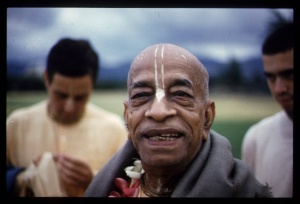CC Madhya 5.89: Difference between revisions
No edit summary |
(Vanibot #0054 edit - transform synonyms into clickable links, which search similar occurrences) |
||
| Line 17: | Line 17: | ||
<div class="synonyms"> | <div class="synonyms"> | ||
''kanyā pāba'' | ''[//vanipedia.org/wiki/Special:VaniSearch?s=kanyā&tab=syno_o&ds=1 kanyā] [//vanipedia.org/wiki/Special:VaniSearch?s=pāba&tab=syno_o&ds=1 pāba]'' — I shall get the daughter; ''[//vanipedia.org/wiki/Special:VaniSearch?s=mora&tab=syno_o&ds=1 mora]'' — my; ''[//vanipedia.org/wiki/Special:VaniSearch?s=mane&tab=syno_o&ds=1 mane]'' — in the mind; ''[//vanipedia.org/wiki/Special:VaniSearch?s=ihā&tab=syno_o&ds=1 ihā]'' — this; ''[//vanipedia.org/wiki/Special:VaniSearch?s=nāhi&tab=syno_o&ds=1 nāhi]'' — is not; ''[//vanipedia.org/wiki/Special:VaniSearch?s=sukha&tab=syno_o&ds=1 sukha]'' — happiness; ''[//vanipedia.org/wiki/Special:VaniSearch?s=brāhmaṇera&tab=syno_o&ds=1 brāhmaṇera]'' — of a pure ''brāhmaṇa''; ''[//vanipedia.org/wiki/Special:VaniSearch?s=pratijñā&tab=syno_o&ds=1 pratijñā]'' — the promise; ''[//vanipedia.org/wiki/Special:VaniSearch?s=yāya&tab=syno_o&ds=1 yāya]'' — becomes lost; ''[//vanipedia.org/wiki/Special:VaniSearch?s=ei&tab=syno_o&ds=1 ei]'' — this; ''[//vanipedia.org/wiki/Special:VaniSearch?s=baḍa&tab=syno_o&ds=1 baḍa]'' — very much; ''[//vanipedia.org/wiki/Special:VaniSearch?s=duḥkha&tab=syno_o&ds=1 duḥkha]'' — unhappiness. | ||
</div> | </div> | ||
Latest revision as of 23:37, 19 February 2024

A.C. Bhaktivedanta Swami Prabhupada
TEXT 89
- kanyā pāba,—mora mane ihā nāhi sukha
- brāhmaṇera pratijñā yāya—ei baḍa duḥkha
SYNONYMS
kanyā pāba — I shall get the daughter; mora — my; mane — in the mind; ihā — this; nāhi — is not; sukha — happiness; brāhmaṇera — of a pure brāhmaṇa; pratijñā — the promise; yāya — becomes lost; ei — this; baḍa — very much; duḥkha — unhappiness.
TRANSLATION
“My dear Lord, I am not thinking to become happy by getting the daughter as a bride. I am simply thinking that the brāhmaṇa has broken his promise, and that is giving me great pain.”
PURPORT
It was not at all the intention of the young brāhmaṇa to get the daughter of the elderly brāhmaṇa in marriage and thus enjoy material happiness and sense gratification. It was not for that reason that the young brāhmaṇa went to Vṛndāvana to ask the Supreme Personality of Godhead to act as a witness. His only concern was that the elderly brāhmaṇa had promised something, and if Gopāla did not bear witness to that transaction, then the older brāhmaṇa would incur a spiritual blemish. Therefore, the young brāhmaṇa wanted protection and help from the Deity. The young brāhmaṇa was thus a pure Vaiṣṇava, and he had no desire for sense gratification. He wanted only to serve the Supreme Personality of Godhead and the older brāhmaṇa, who was also a Vaiṣṇava and very much devoted to the Lord.